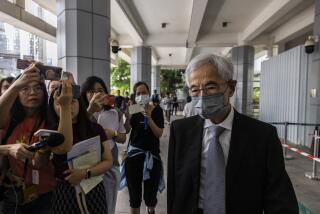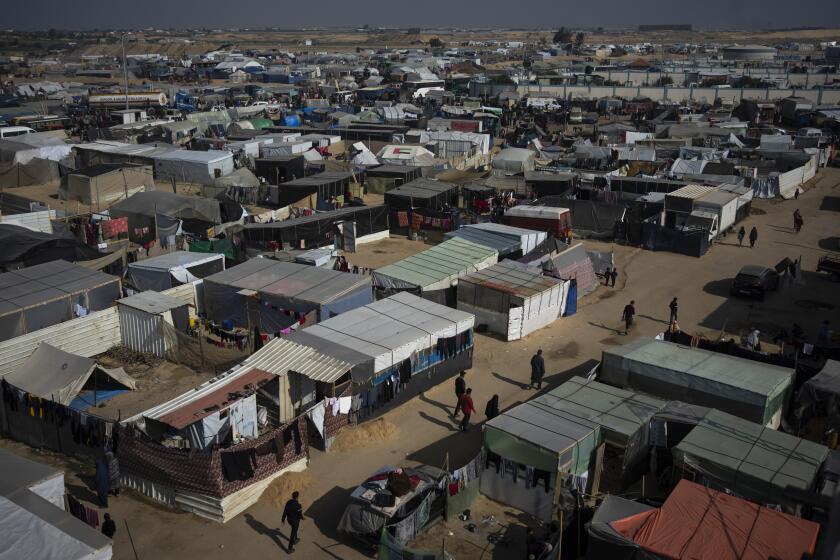DEMOCRACY : Hong Kong Activists Decide to Rock Boat
A band of shouting, placard-waving protesters from the new group “Full Democracy in ‘95” greeted British Foreign Secretary Douglas Hurd when he visited here after consultations in Beijing.
With Sino-British talks over ground rules for Hong Kong’s 1995 Legislative Council elections showing no visible signs of progress, some pro-democracy activists in this British colony say it is time to speak out for what they want, whatever the consequences.
Hanging in the balance is the question of whether Hong Kong’s reversion to Chinese sovereignty in 1997 will proceed smoothly under agreements accepted by both Beijing and the people of Hong Kong. China has made it clear this will happen only if democratic development is severely restricted.
But some here--a distinct minority, so far--say the goal of a smooth transition is not worth the apparent price.
“If we always look at things as to whether it’s realistic, we’re never going to say what we really want, and I think we end up compromising our own ideas and our own desires,” said Christine Loh, a Legislative Council member who helped organize the protest last week by about 60 activists.
“What we hope is for the movement to snowball so that we can have more people joining in and showing the governments concerned that this is for real,” said Emily Lau, another legislator.
Britain and China have been locked in a bitter, nine-month dispute over Hong Kong Gov. Chris Patten’s proposed democratic reforms. The plan would widen voter participation in 1995 legislative balloting but falls short of direct election of all members.
The two governments have held seven rounds of talks on the issue since April, and Hurd said negotiations will go well beyond the eighth round scheduled for next week. Hurd, speaking at a news conference in Beijing, insisted that the goal of a Sino-British agreement on the 1995 elections is still worth pursuing.
“I think everyone in Hong Kong . . . (wants) to see a steady extension of democracy, and they want to see continuity, so that extension of democracy is not abandoned or sacrificed with the change of sovereignty,” Hurd said. “It’s a double objective. The question is whether those two objectives can be reconciled. That is the prize. . . . It’s abundantly worth working for.”
But Loh questioned whether it is still worth placing hope in an election-rules agreement with Beijing, saying: “We are getting a little bit tired of all these rounds of talks not getting anywhere. The fact that these talks are going on has diverted our attention away from what we really want, and that’s full democracy.”
Full Democracy in ‘95, a diverse coalition, backs direct elections for all 60 Legislative Council seats in 1995.
Patten’s proposals do not challenge the planned post-1997 method of choosing Hong Kong’s chief executive, to be done through a complicated process subject to pressure and ultimate control by Beijing.
Analysts here believe that China’s interpretation of the Chinese-authored Basic Law, Hong Kong’s post-1997 mini-constitution, will be the main stumbling block for the pro-democracy movement.
“Although I support my friends in the pro-democracy camp, I think this new group only reflects the difficulties of the full democracy movement in Hong Kong,” said Joseph Cheng, a former professor who has written extensively on Sino-British relations.
“The Hong Kong people may like to see more democracy, but they’re not willing to make sacrifices,” Cheng said.
More to Read
Sign up for Essential California
The most important California stories and recommendations in your inbox every morning.
You may occasionally receive promotional content from the Los Angeles Times.






